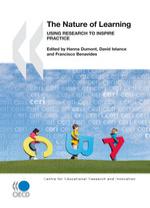The Learning Research Strand
The Learning Research strand aimed to:
Analyse and synthesise international research findings from different parts of the world to inform the design and creation of environments supporting deeper and more effective learning.
A major milestone of this project strand was reached with the 2010 publication:
The Nature of Learning, Using Research to Inspire Practice
 |
The Nature of Learning aims to help build the bridges, “using research to inspire practice”. Leading researchers from Europe and North America were invited to take different perspectives on learning, summarising large bodies of research and identifying their significance for the design of learning environments, in such a way as to be relevant to educational leaders and policy makers.
The early chapters address the nature of learning, including through the cognitive, emotional and biological perspectives. The contributions that follow review approaches and evidence for different types of application: formative assessment, co-operative and inquiry-based forms of learning, technology-based applications – as well as learning beyond classroom environments in communities and families. The penultimate chapter considers strategies to refocus educational organisations with their in-built resistance to innovation and change.
|
|
The chapters do not offer exhaustive coverage of all the relevant research findings but together they provide a powerful knowledge base for the design of learning environments for the 21st century. As summarised by De Corte (Chapter 2), many scholars now agree on the key importance for organisations and policy to develop in learners “adaptive expertise” or “adaptive competence”, i.e. the ability to apply meaningfully-learned knowledge and skills flexibly and creatively in different situations.
Want to know more about the book?
|


